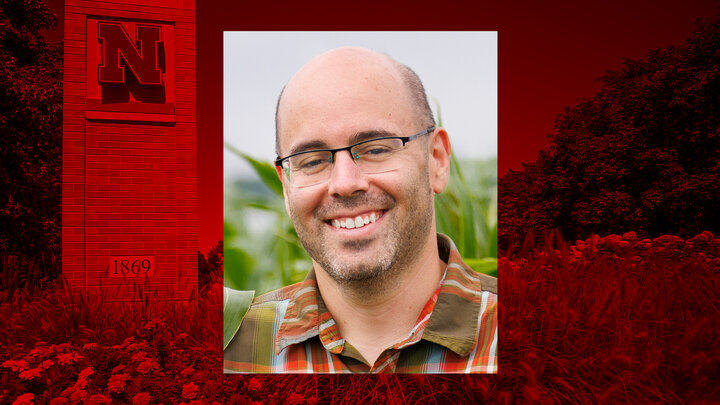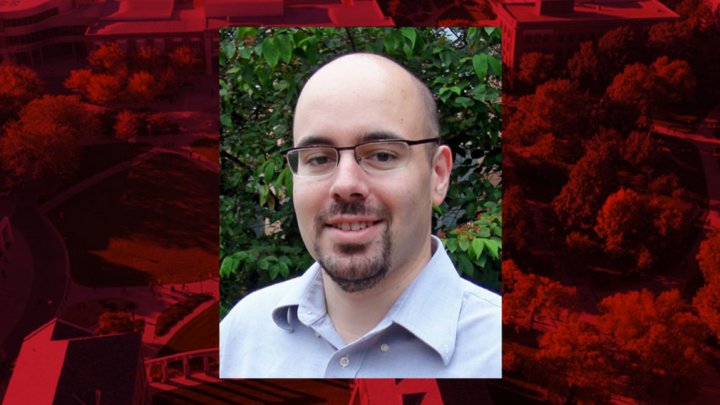Schnable honored with postdoc mentor award

Wednesday, August 21, 2024
James Schnable, professor in agronomy and horticulture, was awarded the Outstanding Postdoc Mentor Award at the University of Nebraska–Lincoln’s Office of Graduate Studies Awards & Fellowship Luncheon May 1 at the Nebraska Alumni Association’s ARKS Champions Club.
This award recognizes faculty members who have demonstrated a sustained commitment and exceptional ability in mentoring postdoctoral scholars and significant contributions to their postdoctoral scholars’ professional and career development.
Schnable has graduated 13 master’s and Ph.D. students, and mentored eight postdoctoral associates. His postdocs have achieved faculty positions worldwide.
According to former postdocs Vladimir Torres-Rodríguez and Seema Sahay, Schnable’s leadership style is excellent preparation for academic and private sector leadership roles. He allows postdocs to make decisions and shape goals and outcomes while committing to support, brainstorm and advise as needed.
“Although my background was related to wet lab with minor expertise in computational biology, Professor Schnable gave me the opportunity to join his lab to learn skills that are allowing me to pursue my next professional goal,” said Torres-Rodríguez, a research assistant professor in the Department of Agronomy and Horticulture.
“He works hard to ensure all the trainees he mentors at both the doctoral and postdoctoral level have the experience of working in disciplinary diverse teams, typically collaborative projects with engineers, statisticians and/or computer scientists,” said Sahay, a research assistant professor in biochemistry.
Torres-Rodríguez, Sahay and other lab members say his mentoring strategy emphasizes giving trainees the environment, support and feedback to develop logistics and planning abilities and interpersonal soft skills.
“Professor Schnable has a key characteristic which distinguishes the best leaders in the field: a willingness to do anything himself that he asks of the postdocs and others in his lab,” Sahay said.
Recently, Schnable received a $650,000 grant from the DOE’s Advanced Research Projects Agency-Energy to scale up a study his laboratory, including Torres, published earlier this summer.
Schnable receives NAPPN Early Career Scientist Award

Friday, February 15, 2019
Lana Koepke Johnson | Agronomy and Horticulture
James Schnable, University of Nebraska–Lincoln assistant professor of agronomy and horticulture, received the inaugural North American Plant Phenotyping Network Early Career Scientist Award at the Phenome Conference in Tucson, Arizona Feb. 6-9.
The NAPPN Early Career Award seeks to highlight leaders in novel research, increasing the visibility of plant phenotyping (peer reviewed publications, presentations, social media, popular press and service), supporting research between public and private sectors, developing (or following) data standard best management practices and/or transdisciplinary engagement.
Schnable joined the university in 2014 and is affiliated with both the Center for Plant Science Innovation and the Quantitative Life Sciences Initiative.
He has been studying how plants perceive and respond to their environments for over 10 years with the goal of developing tools to study functional genetic variation across multiple species. His research involves collaborations with engineers, computer scientists, statisticians and food scientists.
He has also been involved in plant phenotyping for the past six years, although at first he considered it more of a hobby. It allowed him to connect science with Raspberry Pis, miniature computers that can cost as little as $25 but can be programmed to take pictures, collect information from other sensors and send the information back to a research wirelessly.
In 2015 he was encouraged by Brian Larkins, then the associate vice chancellor for life sciences, and Jennifer Clarke, Quantitative Life Sciences Initiative director, to turn that hobby into a second research program focused on high throughput plant phenotyping.
Schnable considers himself to be extraordinarily lucky. It can be really hard to get established in a new line of research and high throughput plant phenotyping was a new field in 2015. He wasn’t far behind as almost no one had much experience with this line of research back then.
The second stroke of luck for Schnable happened because Nebraska decided to invest significantly in a high throughput phenotyping facility at Nebraska Innovation Campus. The automated greenhouse, built by the university with support from the Nebraska Research Initiative, can grow and image corn and sorghum all from germination to maturity.
“The final, and most important, way I was lucky, was to be lucky with people. I was hired as part of a large batch of new faculty in the Institute of Agriculture and Natural Resources,” Schnable said.
“My first two years felt like the first day at a new high school. No one knows who to sit with at lunch yet. That makes it is so much easier to both make new friends and build new collaborations.”
Yumou Qiu, assistant professor of statistics at Iowa State University, and Yufeng Ge, assistant professor of biological systems engineering at Nebraska, were hired at the same time as Schnable and have become his favorite research collaborators.
Zhikai Liang, doctoral student in agronomy and Schnable’s first graduate student, came to his lab as a molecular biologist wanting to learn genomics. Over the past four years, Liang has gone from pipettes to RNA sequencing to now writing his own computer programs to analyze pictures of plants and hyperspectral data cubes. He has also published nine different scientific papers in that same time period.
“Winning this award says as much about the amazing teams I've been a part of, both inside and outside my own research group, as it says about any efforts or abilities of my own,” Schnable said.
The Phenome conference represents a multidisciplinary community comprising plant biologists, ecologists, engineers, agronomists, computational scientists and representatives from U.S. federal agencies who come together in a rich and diverse networking environment to foster collaboration, innovation and the initiation of multi-investigator and multi-institution projects.
NAPPN, founded in 2016, is an association of scientists and researchers in the rapidly evolving area of plant phenomics, formed as a regional partner of the International Plant Phenotyping Network. Schnable has been a member since the beginning.
Schnable receives early career award in maize genetics

April 16, 2018
Lincoln, Neb. — James Schnable, an assistant professor in the Department of Agronomy and Horticulture and Center for Plant Science Innovation at the University of Nebraska–Lincoln, received the Marcus Rhoades Early Career Award in maize genetics at the 60th annual Maize Genetics Conference held in France on March 24.
“It is an honor to receive this award from the maize genetics community,” Schnable said. “It’s also quite special to be given an award named in honor of my academic great-grandmentor, Marcus Rhoades.” Rhoades was an American cytogeneticist who started his career in maize genetics working alongside future Noble Prize winners Barbara McClintock and George Beadle. His research on maize spanned both basic genetics and advances in applied plant breeding.
Schnable was honored for his work delineating the functionality district subgenomes of maize and separate patterns of selection across during the domestication of maize, sorghum and foxtail millet.
At the same the conference, Michael Scanlon of Cornell University received the Lewis Stadler Mid-Career award and Robert Martienssen from the Howard Hughes Medical Institute was awarded the Barbara McClintock Prize for Plant Genetics and Genome Studies.
James Schnable
Assistant Professor
Agronomy & Horticulture
Center for Plant Science Innovation
402-472-3192
schnable@unl.edu